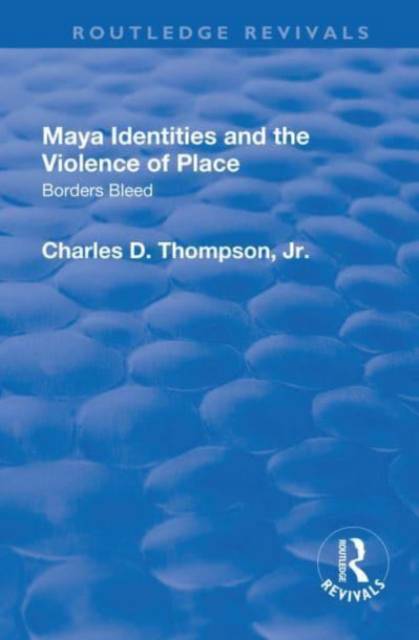
- Retrait gratuit dans votre magasin Club
- 7.000.000 titres dans notre catalogue
- Payer en toute sécurité
- Toujours un magasin près de chez vous
- Retrait gratuit dans votre magasin Club
- 7.000.0000 titres dans notre catalogue
- Payer en toute sécurité
- Toujours un magasin près de chez vous
45,95 €
+ 91 points
Format
Description
This title was first published in 2001. Exploring issues of diversity and cross-cultural interaction and understanding, Maya Identities and the Violence of Place offers new perspectives on borderlands and identities, providing an important case study of people from Latin America on the move. Examining issues of indigeneity, diaspora, flights from physical violence and economic repression, and efforts to remain indigenous among a proud but beleaguered people, this book is replete with stories of movement and change that operate as means to maintain identity. Thompson examines how the Jacalteco Maya of Latin America form their identities as indigenous people, despite a long tradition of movement across the rigid constraints of borders of geography, history, race and ethnicity. Religion, language, fiestas, and stories of leaving and return, all serve to bond people to their particularity. Examining the indigenous identity formations and religious convictions among the Maya in places where brutality has dominated the landscape and where violence is commonplace, this book avoids dwelling on centers of culture and explains instead how Maya concepts of identity arise from travel, contact with others, and change. Thompson reveals the ironies of classifying as natives', aboriginal or indigenous the many individuals and families who have become refugees, and explores how Maya have transcended the erroneous image of Guatemalan Indians ensconced within borders of particular land, and how they have overstepped popular portrayals of native peoples clinging tenaciously to their sacred soil as their sole means of surviving culturally and spiritually. Showing bleeding borders to be more than a recent occurrence, Thompson argues that there has never been a time when Maya did not have to travel in order to remain who they are. Exploring ideas of human to land connections and how religion among the indigenous makes change and movement possible, this book offers invaluable insight
Spécifications
Parties prenantes
- Auteur(s) :
- Editeur:
Contenu
- Nombre de pages :
- 206
- Langue:
- Anglais
- Collection :
Caractéristiques
- EAN:
- 9781138733992
- Date de parution :
- 04-11-19
- Format:
- Livre broché
- Format numérique:
- Trade paperback (VS)
- Dimensions :
- 154 mm x 233 mm
- Poids :
- 381 g

Les avis
Nous publions uniquement les avis qui respectent les conditions requises. Consultez nos conditions pour les avis.






